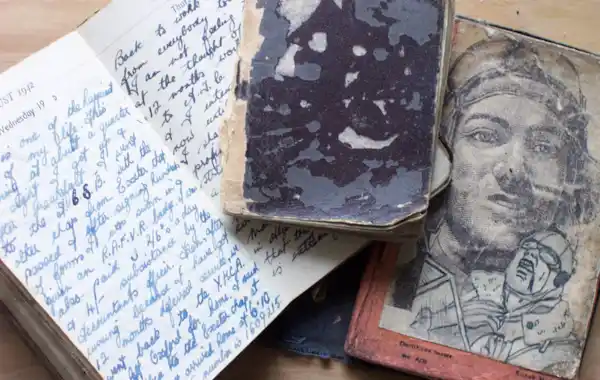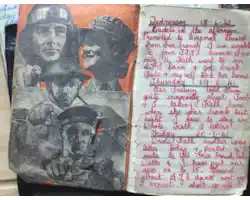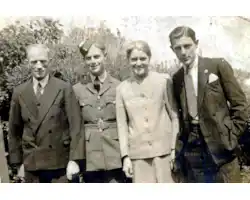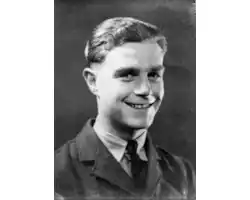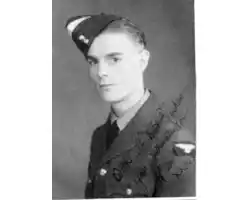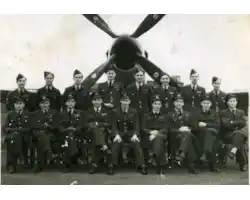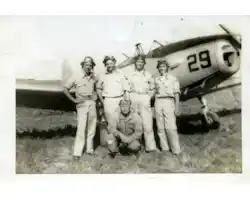09 September 2019
|
On the brink of the Second World War many a young lad tried to sign up to fight, just as their father's had before them. This time, however, the regulations were much more strict. Here Tom East relates the tale of a keen young hopeful who had to bide his time, waiting in the wings until he was old enough
An account of one man's lifelong love of flying, from a childhood pleasure flight, through decades of service in the RAF, before finally hanging up his goggles in 1985. Based on the youthful diaries of 'Blackie' Blackwell, Tom East tells his story...
In 1932, when he was just seven years old, Blackie James Blackwell and his younger brother Raymond took to the skies. This was in a simple pleasure flight near to their home in Alcombe, near Minehead. It was meant as nothing more than a treat by the boys’ Aunt Annie, but it was to have lasting consequences for one of them. Raymond decided that flying was not for him, but it was to dominate his elder brother’s whole life.
Not long after Blackie's maiden flight, on 30 January, 1933 to be precise, Adolf Hitler was elected Chancellor of Germany, so putting Europe and the World on course for the Second World War and the darkest period of the troubled 20th century. These two events, the one shaping a boy’s life, and the other shaping the destiny of the whole world, are vividly brought to life in a series of small diaries preserved today by Blackie Blackwell’s family.
As we all know, war was declared on 3 September 1939, when Blackie, as he always preferred to be known – one reason was that he wanted to avoid the school nickname of ‘Inkwell’ – was only 14. But already he was a member of the Air Defence Cadet Corps (ADCC), which had been founded by Air Commodore JA Chamier in 1938. This became the Air Training Corps in February, 1941. At the same time it took on an altogether more earnest purpose.
The Government had belatedly recognised the valuable contribution of the ADCC to the training of future RAF pilots. King George V had even granted a Royal Charter. But at this time aeroplanes for training purposes were in short supply. There weren’t even enough gliders available to give all the young men who wanted to take to the air an experience of flying. Many cadets were disappointed.
Blackie was one of the lucky ones. His early membership of the ADCC – he joined in June, 1939, shortly after his 14th birthday – meant that he was at the front of the queue. But he was still too young. The very first record in the earliest surviving diary, for Wednesday 18 June, 1941, includes this reference:
‘Cadets in the afternoon. Promoted to Corporal. Heard from Free French. I am unable to join F.F.A.F because I am only 16’. The entry for two days later reveals that he '...posted a note to the Free French Cdr. Watts & I have put our ages on to 18’ . He had a final reply on 15 July, 1941, as the diary for that date reveals: 'Heard from the Major of the Free French Air Force. It is no use trying to get in it because they know I am too young.'
From then on he concentrated on getting into the RAF. The record for 15 July 1941 reads: ‘I am 16 years & 2 months today & that means that unless I put my age on I have got to wait 1 year & 1 month to get in the RAF as a man’. A few weeks later, on 1 August, 1941, the entry is: ‘Nights are beginning to get darker now & time is gradually slipping by & I shall know whether I can get in the RAF or no. Dad wrote a long letter, enclosing my Railway Warrant, to Exeter this morning & as he was doing this I received a note from the Recruiting Officer asking if I wanted to continue with my enlistment. If I did I had to name a date when I could report. I can think of one now: - August 15th 1942.’
Dad – Aubrey Blackwell – received a reply to his letter just three days later. For what was then the August Bank Holiday, the diary reads: ‘August bank holiday & it rained all the afternoon. Dad got a reply to his letter this morning. I am now on a waiting list & immediately I am 17¼ I shall be enrolled in the Royal Air Force (For Flying Duties only). This isn’t bad news but it means that I have to wait a year before shall be able to start my flying-training. I shall count every day & let the time slip by until August 15th 1942 arrives. It is strange waiting for something to happen which will decide the future.’
So Blackie had to accept that his flying service was going to be in what must have seemed to him to be the distant future. The diary notes continued, giving a fascinating record of the times. Some of the entries read like a spotter's guide to wartime aircraft. Sightings of Hurricanes; Spitfires; Healeys; Beaufighters; Whirlwinds; Tomahawks and many other aeroplanes are dutifully recorded.
On 30 June, 1941 a rather special event is noted: ‘A Spitfire came down on the Golf Links. It had run out of petrol & made a forced landing without its undercarriage.’ There are also many careful entries like this one for June, 1941: ‘27 more Germans brought down over France yesterday & we lost only 1. With bombers brought down over British Isles Germany has now lost 58 planes in 2 days’.
Along with the notes that provide a (slightly optimistic, the modern reader might think) picture of the fortunes of the RAF are many that give brief details of major wartime events, like ‘Germany declared war on Russia.’; ‘The Vichy government have concluded the Armistice’ and ‘British troops have entered Beirut’.
Not all the entries are concerned with the progress of the war. Life still had to go on, even in those dark days. Blackie was a scholarship pupil at Minehead County School, and recorded his “swotting” for the School Certificate Examinations. On 24 July, 1941, in confessional mode after the examinations, he wrote: ‘I shall be miserable next term because nearly all the form have left & I expect I shall be in the sixth. If I don't matriculate, & it will be a miracle if I have, I shall take School Cert. again next Christmas.’
It wasn’t all schoolwork and war. Many of the entries record social activities, like going to town or to ATC and other dances with friends. He was a frequent visitor to the cinema. His opinions on films like Love on the Dole; How Green Was My Valley; They Met in Bombay; This England; and Gulliver's Travels are directly stated. These views were usually briefly given, but on 6 April, 1942 he was relatively effusive about the second feature film he’d seen. He wrote: ‘The small was the best. It was called “Behind Enemy Lines” & was a story, made in Russia, of a squad of Red Army men.’ It is easy to imagine that his primary concerns about the war had been stirred by this film.
The early months of the diaries give a heartfelt account of what the adults of that time no doubt believed to be ‘puppy love’. For a few short but intense weeks, Blackie was infatuated with an older girl called Kath, who apparently showed some interest in his attentions. There were occasions in the earlier part of June, 1941 when he was writing her two letters a day. But by the end of the month he wrote that: ‘Kath said that we were no more than friends in front of Mr. and Mrs. Frewin & Jean so she can go to Hell for all I care.’ The next day he wrote that he was ‘Feeling very miserable today’. But by 5 July he was able to write about a letter he had sent to her in which he: ‘...told her that it would be best for us to be ordinary friends. Perhaps she will answer my letter or perhaps she won’t. It doesn’t matter.’ Blackie seems to have been as good as his word because the later jottings about Kath don’t show anything like the ardour of the earlier ones.
His greatest concern was always the war effort. In September, 1941, he enlisted in the Home Guard. This experience was often disappointing to him, as can be surmised from the entry of 22 October, 1941: ‘We had “firing” practice under Sgt. Holmes. I have been in the Home Guard a month now. My rifle number is 209 – the last in the Home Guard but I still have to borrow someone else's rifle because I can’t find one of that number.’ Not only did he have firing practice without bullets, but with a borrowed rifle, too.
In November, 1941, he decided to work full-time and took up employment with a local engineering firm. This made heavy demands on him: a 56-hour week was the norm and an eleven-hour day was not unusual. Coupled with his demanding Home Guard duties, this left him little time to himself. He may not have appreciated it, but was in fact making a considerable contribution to the war effort with his factory work. For much of 1942 he was working on a lathe turning out telescope windows for aeroplanes as well as producing numbers of something he always referred to as “P.O.Gs”.
Always at the back of his mind was the date on which he would attain seventeen-and-a-quarter: 15 August, 1942. The day after this, a Sunday, found him in Exeter. His diary-record for that evening states that he ‘...walked around Exeter this evening. The Bomb Damage is terrible & buildings are still being pulled down.’ On the next day he ‘got to the Recruiting Office at 9.30. 5 of us were drafted to Oxford. I was paid 3/6. We missed the 10.5 train and had to wait for the 12.55.’
As you read the diary you can sense that his expectations were rising. On the Tuesday he said: ‘Today is a Red Letter day for me... I did the Maths, Morse aptitude, mind step, Selection Board & medical. I got through OK including the mercury column.’ On the Wednesday he wrote: ‘Today is one of the happiest days of my life... I went to the A.C.S.B. with the other chap from Exeter that passed & after signing hundreds of forms I was sworn in & given a R.A.F.V.R. badge. I was also paid 3 2/6's a day & 4/- subsistence by the Accountants officer’. But he had to balance his elation by recording: ‘Then, after cussing because I have got 12 months deferred service, we went back to the Y.M.C.A. & left Oxford for home. I said goodbye to the Exeter chap at Taunton & arrived home at 6.10. My R.A.F. number is 1609215.’
The young man wrote again to the RAF soon after he returned home, and on 25 October recorded the disappointment of the reply he had received: ‘This afternoon I had a reply from R.A.F Records. There doesn't seem to be much hope of my being called up before I am 18¼.’ His diary entries for the rest of the year are sporadic. One wonders if this was the result of disappointment; lack of time because of the demands on him; or just a case of a youth becoming bored with assiduous diary-keeping.
But in 1943 he was to take to the skies on active service. His love affair with flying took him to Miami and Oklahoma where he practised his lifts-off and touches-down. On his return to the UK, Blackie went before a panel for his first squadron selection. Really, he was too tall at 5'7" to be selected as a Spitfire pilot, but he made sure he measured up to the required 5'6" by bending his knees. Luckily the selection panel were seated behind a desk.
His first solo flight in a Spitfire was in April 1945. This was a month before Blackie’s twentieth birthday and in the same month that Adolf Hitler met his end in a Berlin Bunker. At long last Blackie had fulfilled his boyhood dream. After this he went on to fly a variety of aircraft including Mustangs, Mosquitoes, Meteors, Vampires, Hunters, Pembrokes and twin-engined Pioneers. In all, he piloted twenty-three types of aircraft.
In 1968 he finally had to hang up his flying goggles, having completed over 3,000 hours flying time and travelling the world. His RAF career continued in Air Traffic Control until he retired at the age of 60 in 1985, after no less than 42 years in the RAF.
Blackie was one of the last serving Master Pilots. The pleasure flight he took around Minehead 53 years earlier had shaped his whole life.
Tom East’s family- history related Tommy’s War: July, 1914, was featured in our May, 2019 issue. His latest novel is The Gospel According to St Judas. He is grateful to Mrs. Brenda Davies for letting him have use of her father’s diaries and photographs for this piece.
https://www.benybont.org/







